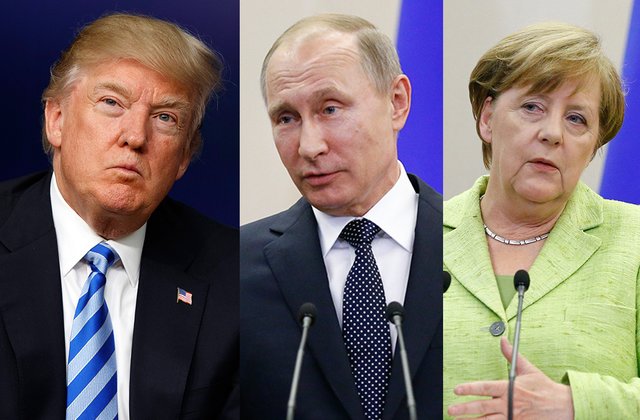With Chinese aggression taking grip of the entire Indo-Pacific, Washington is feeling compelled to find some kind of common ground with Russia and chase China out with all its vigour. But German Chancellor Angela Merkel is single-handedly stalling all attempts of a reconciliation between the US and Russia. The leadership in Germany believes it stands to gain out a US-Russia confrontation and is, therefore, making all attempts to project Moscow as the main enemy of the democratic world order.
Berlin has now rejected a proposal made by the US President Donald Trump to allow Russia back into the Group of Seven (G-7) countries- a group of the world’s most advanced economies. German Foreign Minister Heiko Maas told Rheinische Post, a leading Germany daily, “The reason for Russia’s exclusion was the annexation of Crimea and intervention in eastern Ukraine.” He added, “As long as we do not have a solution there, I see no chance for this.”
In fact, Germany is trying to stall the proposal of an expanded G-7 itself. Trump wants to widen the G-7 itself by including more countries like South Korea, India and Australia, and if possible Russia also. The US President wants to isolate China by bringing all global powers under an umbrella organisation. However, Germany has objected.
The German Foreign Minister Maas also said that G-7 and G-20 are two sensibly coordinated organisations, and that G-20 already includes Russia. The Minister added, “We don’t need G11 or G12.”
This is hardly the first time that Germany has tried to antagonise Russia in the Western world. Only last month, Merkel had announced that the European Union (EU) leaders have decided to extend the Crimea-related sanctions on Russia by a further six months.
Speaking after a video conference of the EU leaders, the German Chancellor had also declared that Berlin reserved the right to react after prosecutors alleged Russia of ordering the killing of a Georgian citizen last year.
Merkel is weaponizing her position as the de facto EU head to impose tough sanctions on Russia over the Crimea episode of 2014. Even though Crimea had voted overwhelmingly in favour of Russia, Germany remains hell-bent on imposing tough sanctions on Moscow and ravaging its economy.
Merkel knows that the Atlantic and the European Union will remain relevant as long as Russia is viewed as the main rival of the Western world. And this is why she wants to antagonise Russia. Germany is also making it a point to put hurdles in the Indo-Pacific tilt of the American foreign policy and military doctrine.
But Merkel isn’t just averting a US-Russia reconciliation, she also wants the best of both worlds. Therefore, the Angela Merkel-led German government allowed the construction of the Nord Stream 2 pipeline- an ambitious project to supply natural gas from Russia to Germany, which runs parallel to Nord Stream, despite the reservations of the United States and many central and Eastern European countries.
Many countries including Poland and the Baltic republics of Latvia, Lithuania and Estonia, which are members of the European Union, opposed the construction of the pipeline given its geostrategic advantage to Russia.
In fact, the pipeline project would make Germany completely dependent on Russia for its energy resources. 40 per cent of Europe’s energy supplies are already controlled by Russia, which can be used as a strategic advantage, and this project would further the reliance on Russia, the same country that the German-led European Union advocates sanctioning over several matters.
To be precise, the ambitious pipeline project would also water down Ukraine’s strategic importance as it will be bypassing the country, isolating it in the geopolitical equation. On one hand, Merkel wants to help Ukraine by sanctioning Russia for the Crimea invasion of 2014, but on the other hand, she is also sidelining Ukraine when it comes to German business interests in Russia.
Merkel’s end motive is to manipulate American foreign policy in such a way that the US and Russia keep fighting over anachronistic issues, and Germany keeps gaining out of it. At the same time, Merkel wants to divert attention from her country’s biggest trade partner China. This is why German Ministers want sanctions on Russia, but claim that China cannot be sanctioned over lack of transparency.
By pitting the US against Russia, Berlin can enjoy American bonhomie in the Atlantic, and at the same time pursue its energy-related needs in Russia while also maintaining strong trade ties with Beijing. Merkel is therefore the only leader dividing Russia and the US from forming a strategic understanding for the sake of larger global interests.
